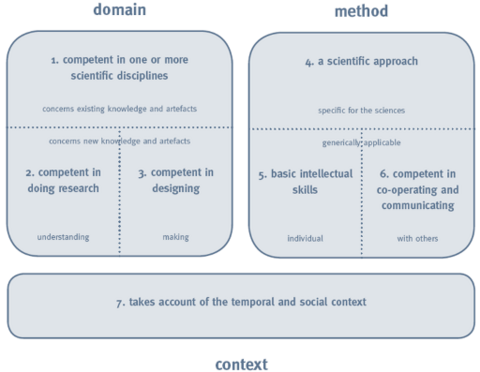Philosophy outside your field of study?
In light of the fact that you are no doubt very busy with your master’s courses and projects, and that to all appearances these courses teach you how to be a good engineer, why would you consider spending even more time on courses? Indeed, why would you spend this extra time on courses which, like those in philosophy, appear to be outside of your field of study?
The quick answer is: to make you a better engineer.
University Graduates’ competences
A university graduate should have seven areas of competence, located in three spheres *.
These spheres were defined by the three Technical Universities of The Netherlands (3TU). University students – including engineers – should be trained in all three of these areas. In most Master's programmes, time is spent primarily on domain-specific areas of competence. The Philosophy Certificate, however, focuses mostly on the first two of the method-specific areas of competence:
Scientific approach: “A university graduate has a systematic approach characterised by the development and use of theories, models and coherent interpretations, has a critical attitude, and has insight into the nature of science and technology.”
Basic intellectual skills: “A university graduate is competent in reasoning, reflecting, and forming a judgment. These are skills which are learned or sharpened in the context of a discipline, and which are generically applicable from then on.”
Moreover, the context-specific area of competence is often a source of inspiration and reflection for the Philosophy Certificate.
Temporal and social context: “Science and technology are not isolated, and always have a temporal and social context. Beliefs and methods have their origins; decisions have social consequences in time. A university graduate is aware of this, and has the competence to integrate these insights into his or her scientific work.”
The Philosophy Certificate is a valuable addition to your degree because it focuses on those aspects of becoming an academic engineer that your degree focuses least on.

Fun factor
Following the Philosophy Certificate makes good pedagogical sense, but is also a lot of fun! Compulsory courses are often characterized by uninterested and noisy students, while electives are chosen out of interest. During Philosophy Certificate courses, students are encouraged to develop their own views and to interact with fellow students in discussion. Classes are usually small, allowing an informal atmosphere. The Philosophy Certificate courses are intellectually stimulating and personally rewarding, say former students.
Of course the above is only an overview of the Certificate. What you will actually learn and do will vary from course to course and lecturer to lecturer. Looking at course descriptions and course evaluations should give you more insight into what you can expect in practical terms.
* The diagram and all quotes on this page are taken from “Criteria for Academic Bachelor's and Master's Curricula”.